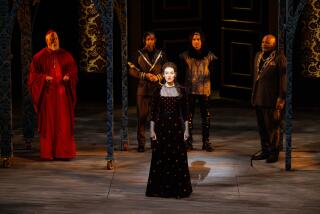Critic’s Notebook: Shakespeare and the politics of our age: Trump, ‘Julius Caesar’ and now ‘Richard II’
Reporting from San Diego — Shakespeare clearly lies outside the right-wing attack machine’s area of expertise. While Breitbart News and friends were busy waging a full-scale war against the New York Public Theater’s production of “Julius Caesar” in Central Park, there wasn’t even a Drudge Report blip on “King Richard II,” another Shakespearean drama that could put Donald Trump in unflattering light.
To be fair to the Fox News flamethrowers, the blond wig Richard dons early on in the outdoor production at San Diego’s Old Globe looks nothing like Trump’s coiffure. But you’d think a drama about the deposition and murder of a king temperamentally unfit to lead a nation would be the last straw for conservative bloviators convinced that Shakespeare has joined the resistance.
I didn’t see Oskar Eustis’ controversial production of “Julius Caesar,” which ended June 18. (The minor disruptions by protesters had as little effect on the run as I suspect the withdrawal of support by cowardly corporate sponsors will have on the future of free Shakespeare in Central Park.) I am certain, however, that the assassination of Caesar isn’t the culmination of the tragedy but a turning point in a drama questioning whether violence is ever an appropriate political tool. (For those with the high-school sophomore stamina to make it to the end of the play’s fifth act, the answer is a resounding no.)
In normal times, it might not be advisable to foist such an inexact analogy between Trump and Caesar. Eustis’ production kitted the Roman ruler out in Trumpian style. Suit, tie and the defiant hay-like crest were uncannily similar. Risking lampoon overkill, a Melania-inspired Calpurnia spoke with an Eastern European accent of indeterminate origin.
All of this made the brutal stabbing scene at the Senate house naturally very explosive. But the sudden switch in rhetorical registers, the famous “Et tu, Brute?” that Caesar utters before the death blow, foreshadows the truths Brutus (the tragedy’s real protagonist) will glimpse all too late about the unpredictability of history and the opacity of even the purest motives.
“Julius Caesar” doesn’t require sensationalizing Trumpery to seem modern.
“Julius Caesar” doesn’t require sensationalizing Trumpery to seem modern. The play grapples with such topical concerns as the fickleness of public sentiment, the rhetorical shenanigans of demagogues and the weaponizing of fake news, which Cassius deploys to convert Brutus to the conspirators’ side.
There’s even discussion of what to do with a leader who could kill someone in broad daylight and not lose supporters. In reporting on the slavish devotion of Caesar’s plebeian backers, Casca observes that “if Caesar had stabbed their mothers,” they would continue to pledge their undying love. The fate of the Republic does appear to be on the line, but as the silver-haired Senator Cicero cautions, “Indeed, it is a strange-disposed time; But men may construe things after their fashion.”
“Julius Caesar” seems to me especially timely because it forces us to question the political certainties that can entice citizens to take the law into their own hands. The critical consensus was that Eustis’ production did justice to the play’s complexity, but it should come as no shock that the inflammatory theatrical imagery ignited the media mob. Equally unsurprising, few conservative firebrands felt the need to fact-check their Shakespeare.
But amid all the dumbed-down outrage, it’s good to be reminded that theater is still a dangerous art form. The reason Plato, the church fathers, generations of Lords Chamberlain and Jesse Helms and his National Endowment for the Arts-axing kind distrusted the stage had little to do with its use as a forum for intellectual debate. Rather, it is the power of spectacle — the symbol made flesh — that has made theatrical performance throughout history so disconcerting to those in authority.
That image defeats idea, or that bumper sticker vanquishes policy platform, will not be news to anyone who was awake during the last presidential election. The reptilian brain is still the most effective way of captivating a crowd. But how can theater artists committed to reason, subtlety and dialectical thought stand a chance in a culture of distraction, distortion and deafening din?
Erica Schmidt’s production of “Richard II” does nothing to call attention to the relevance of Shakespeare’s drama. The strength of the staging is in the lively pace of the storytelling, which unfolds on an artfully medieval set by John Lee Beatty. The tale is trusted: The audience is invited to enter the playwright’s historical imagination without extra-textual coaxing.
The characterizations are straightforwardly depicted. Richard II is often portrayed as a lisping, effeminate fop. Robert Sean Leonard doesn’t overdo the decadence. His Richard wears his pristine white gown and glittering crown with an arrogant defiance, but he is a king with serious character defects rather than a flouncy parody. His disrespect for property rights is what ultimately does him in, not his effete manner.
It’s an unfussy portrait of a famously fussy king who finds tragic dignity in poetic language only after his impolitic behavior costs him his throne. But the performance is of a piece with a production that allows Tory Kittles (in the role of the usurping Henry Bolingbroke) and Nora Carroll (who plays forlorn Queen Isabel) to excel with clarity and proficiency.
How can theater artists committed to reason, subtlety and dialectical thought stand a chance in a culture of distraction, distortion and deafening din?
These might seem like terms of faint praise, but I don’t intend them as such. The production not only held my interest but also allowed me to ponder (without any prodding) how this late 16th century play speaks to our politically divisive moment.
Richard holds fast to the belief that because he is a divinely appointed king, he can do whatever he likes regardless of tradition and the conventions of fair play. But in the company of parasitic flatterers, he takes his royal prerogative too far. Overtaxing the poor is one thing; ransacking the rich is quite another. As the dying John of Gaunt (a fine Charles Janasz) memorably puts it in his patriotic paean to his homeland, “This land of such dear souls, this dear dear land, / Dear for her reputation through the world, / Is now leased out, I die pronouncing it, / Like to a tenement or pelting farm.”
These words may strike some as peculiarly apt for an America in which private interests have run roughshod over the public good. But I was more intrigued by the way this distant notion of the divine right of kings, which Shakespeare boldly challenges without completely dismissing, provoked me to question a few articles of faith in our own democracy.
Our confidence in our system of checks and balances, to take one example, can sometimes seem as naïve as Richard’s contention that “Not all the water in the rough rude sea / Can wash the balm off from an anointed king.” This heretical connection is my own. But Shakespeare’s drama, with its free play of ideas exposing the fragile human underpinnings of social institutions, is what prompted its birth. Fiction, historical and otherwise, shows us our own visage in disguised form.
Elizabeth I, the queen whom Shakespeare had to be careful not to anger, is reported to have complained, “I am Richard II, know ye not that?” Surrounded by political enemies who were plotting her overthrow, she had reason to object that “this tragedy,” depicting the demise of a monarch who also had no heir, “was played 40 times in open streets and houses.” Fortunately for world literature, Shakespeare’s company wasn’t closed down, even though it performed the play at the request of a few of the conspirators on the eve of the abortive coup known as Essex’s Rebellion.
Historical distance may have shielded Shakespeare and his troupe from a sterner fate. He wrote not only with balance and complexity but also in poetic code — a necessary skill for a political survivor who lived in times that make ours seem tame by comparison.
Shakespeare would no doubt get a kick out of being the center of a 21st century media firestorm, but he wouldn’t at all be surprised by the eye-rolling terms of the debate. Human nature doesn’t change all that much. He left the passing partisan squalls to the pamphleteers, whose names are buried with their authors, and focused on political truths that are not of an age but for all time.
SIGN UP for the free Essential Arts & Culture newsletter »
Follow me @charlesmcnulty
More to Read
The biggest entertainment stories
Get our big stories about Hollywood, film, television, music, arts, culture and more right in your inbox as soon as they publish.
You may occasionally receive promotional content from the Los Angeles Times.











